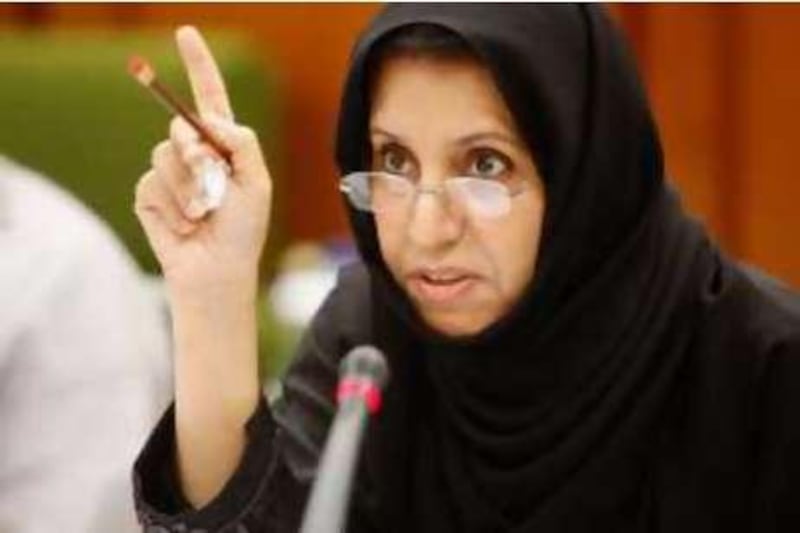DUBAI // Young couples are being urged to curb "unacceptable" spending on dowries and other wedding costs, following reports of amounts in the hundreds of thousands of dirhams landing newlyweds in debt. Dr Maitha al Shamsi, Minister of State and the chairwoman of the Marriage Fund, called on Emirati couples to set "reasonable budgets". "The dowry in itself isn't the only issue here," she said.
"However, we would like to observe that wedding costs must be kept moderate. Some people require vast amounts be spent on lavish ceremonies and this is unacceptable. We advise young men to set aside reasonable budgets for wedding ceremonies." Some grooms are being asked to give amounts exceeding Dh150,000 (US$40,000) for the mahhar, or dowry. Sometimes the bride can keep the entire amount, but more commonly at least part of the money goes towards covering some of her wedding costs.
"For some people, it is symbolic or it represents merely what the bride needs to buy for her wedding such as the wedding dress and some jewellery," Dr al Shamsi said. "No one other than the bride benefits from the dowry, which she spends on her personal apparel for the wedding." In the mid-1990s, the problem of excessive dowries reached the highest ranks of the Government, with Sheikh Zayed taking steps to curb spending.
The late President limited the amount that can be given as a dowry to Dh20,000, with a further Dh30,000 set aside in the event that the marriage ends in divorce. A maximum of Dh20,000 is listed on the marriage certificate, but families often set their own dowry amounts. However, experts say that it is not only the high dowries that are putting pressure on young couples. The often prohibitive costs of a wedding is leading to domestic strife before they have even moved in together.
The Marriage Fund, which provides marriage grants and sponsors group weddings for Emiratis, has recently started to look into young Emiratis' perceptions of marriage and to stress the responsibilities that come with tying the knot. The Fund had organised seminars focusing on the costs associated with weddings, discouraging "extravagance", Dr al Shamsi said. "[It's] so that they don't take on their shoulders what they won't be able to handle," she said. "In the end, marriage is a partnership between two people, and everyone must work towards the success of that marriage."
Aisha al Suwaidi, the director general of the Dubai Women Establishment, believes that overspending on weddings has become a "dilemma". "Your feelings and values cannot be valued with money," she said. "We need to go back to our roots and values." According to Ahmed al Hammadi, the general manager of the Youth Centres run by the Sharjah Government, too many young marriages end in divorce because of problems brought on by financial burdens.
The Marriage Fund is also looking into the issue of the high divorce rate. Although there are no official statistics, recent estimates put the rate at over 30 per cent. "Young people have to be more realistic and not just expect what they see in romantic films," Mr al Hammadi said. "These young people need to learn about marriage and what they want and need, and how they can plan for their life and family. A marriage is not like a car, you can't just change it all the time."
Widad Lootah, a family adviser who has counselled young Emirati couples, also believes that the amount being spent on some weddings is "too high", leading to young couples ending up with massive amounts of debt at the beginning of their married lives. "Debts have an extremely negative impact, since couples will not be able to live a peaceful life," she said. However, while some families continue to spend great sums on weddings, others advocate a more reasonable approach. It is also not uncommon to hear of families asking for a symbolic amount or for the groom to perform a Quranic recitation for the dowry.
Some parents have been known to ask for nothing at all. Among them is Abu Rashid, an Emirati father from Ajman, who believes that he is not alone. "I didn't take a penny when my daughters married," he said. "If my daughter wanted to marry a man in debt she would sacrifice later on." @Email:zconstantine@thenational.ae






